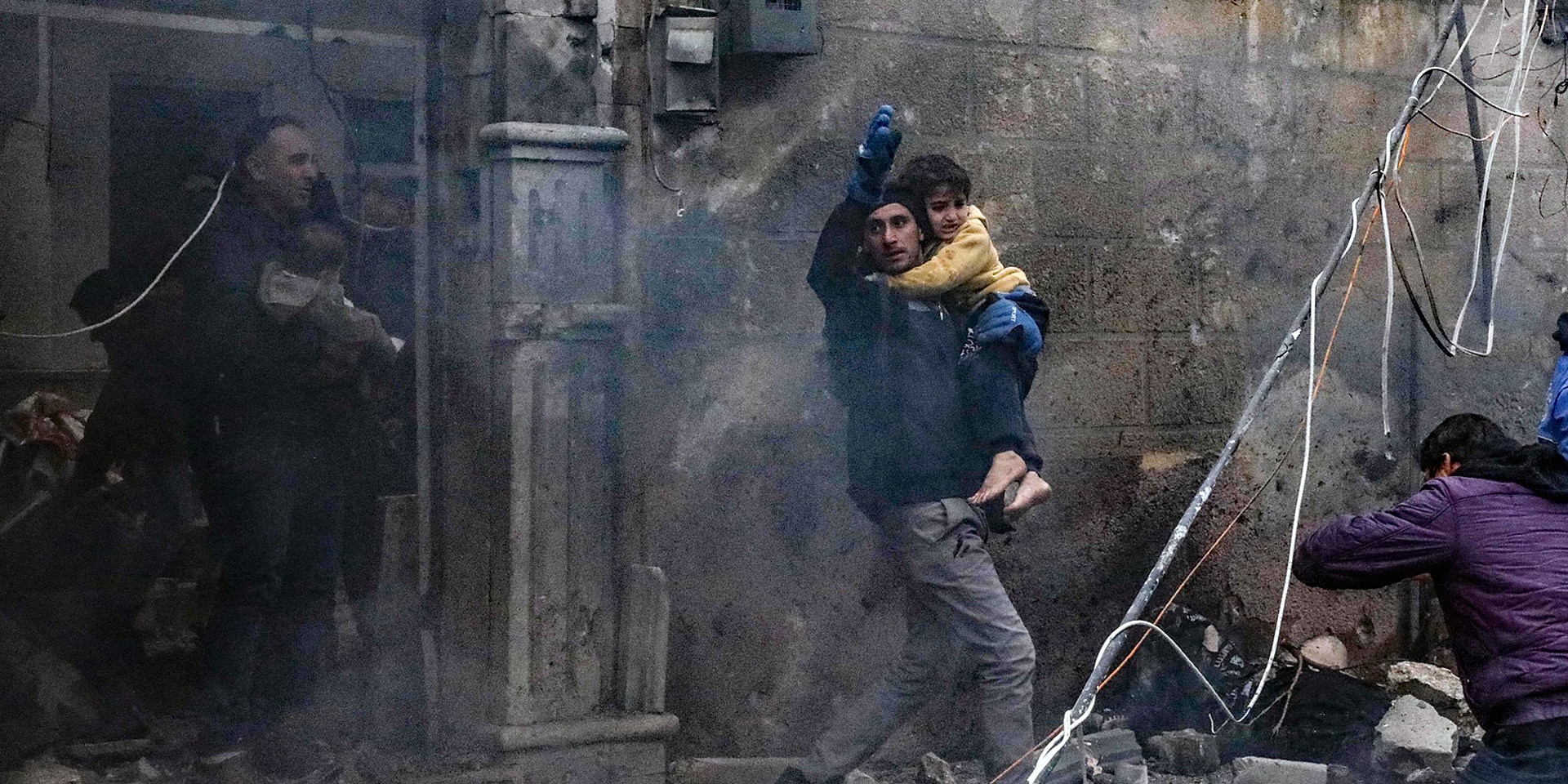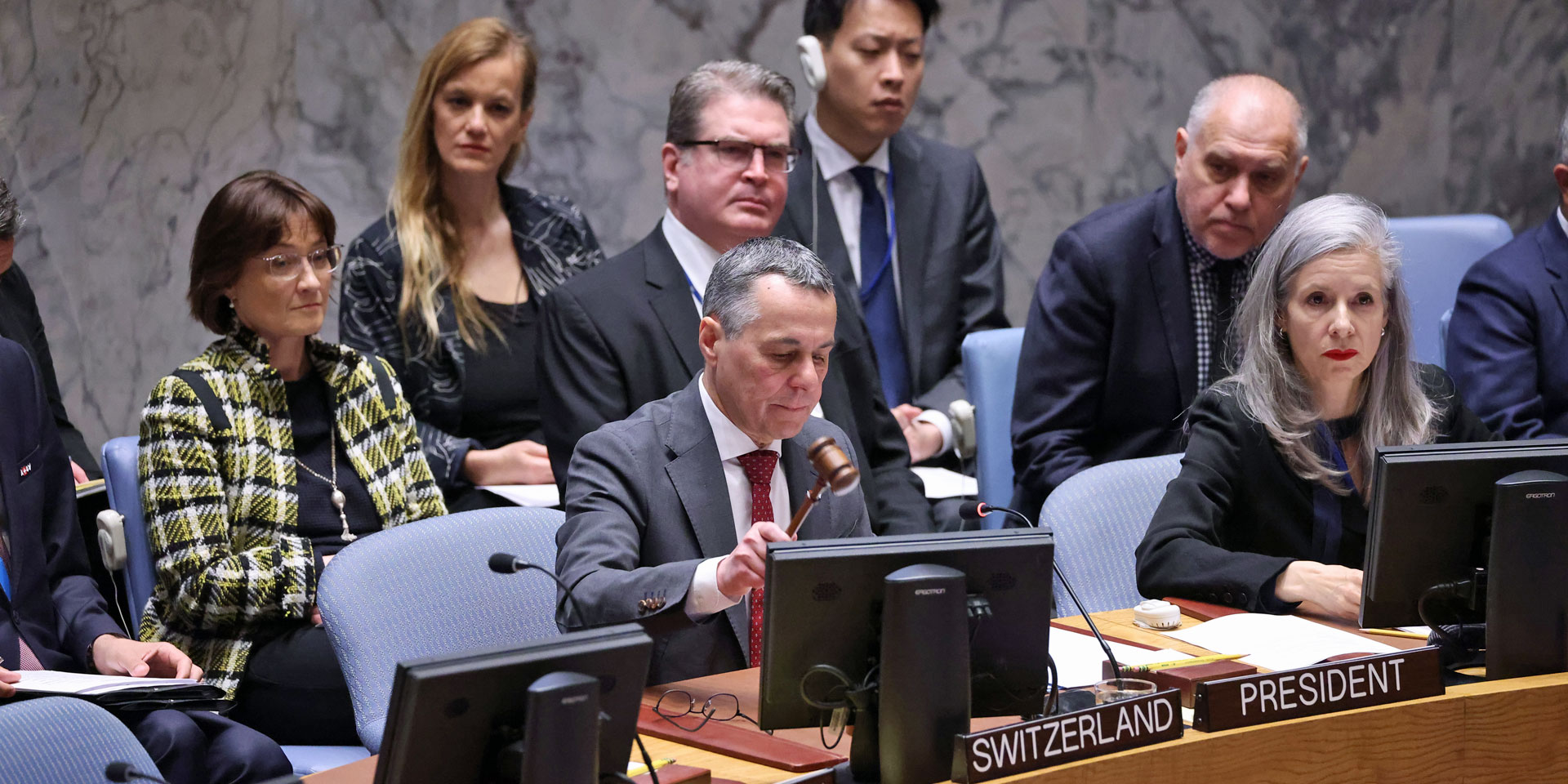The UN Security Council resolution on the protection of civilians is 25 years old
The protection of civilians in armed conflicts is an important goal of Swiss foreign policy. It is committed to ensuring that human dignity is also safeguarded during armed conflicts and that the rules of international humanitarian law are observed in times of war. Here are a few examples from across our regions of operation and priority areas.

At the scene of an explosion in the town of Azaz in the rebel-controlled northern countryside of Syria's Aleppo province. © Keystone
In 1999, the Security Council adopted a resolution that for the first time dealt comprehensively with the protection of civilians in armed conflict. 25 years later, this issue continues to face serious threats and challenges. Armed conflicts are on the increase throughout the world, and it is the civilian population that suffers the consequences most: civilian infrastructures such as hospitals and schools are destroyed; access to humanitarian aid is not guaranteed or is insufficiently guaranteed; mines and other remnants of war munitions contaminate territories. These are just a few examples of the problems to which the civilian population is exposed during armed conflict.
An erosion of the principles and rules of international humanitarian law can be observed. Violations are frequent and the parties involved in hostilities often apply selectively the rules of international humanitarian law - or ignore them altogether. This was emphasised today by Thomas Gürber, State Secretary of the FDFA, at the Security Council in New York.
Switzerland is contributing to strengthen respect for international law in Colombia and Myanmar
Switzerland is one of four states supporting the peace process between the armed group Ejército de liberación nacional (ELN) and the Colombian government, and is one of the guarantor states for the start of peace negotiations between the government and the Estado Mayor Central de las FARC-EP (EMC). It is working towards a ceasefire and cessation of attacks and threats against protected persons and property. As part of the implementation of the 2016 peace agreement, Switzerland is also providing technical expertise in relation to the participation of civil society, the ceasefire and dealing with the past. At the request of the Colombian government and the FARC-EP, it is also keeping an original copy of the 2016 final agreement and a backup copy of the archives of the Colombian Truth and Reconciliation Commission.
After a long civil war, Myanmar remains one of the countries most affected by landmines in the world. Since the military coup of 2021, the proliferation of landmines has reached alarming levels, posing a serious threat to civilian populations. The number of civilian victims of accidents caused by landmines rose by 270% from 2022 to 2023. Switzerland has been supporting Humanitarian Mine Action (HMA) since 2014, in partnership with the Danish Refugee Council (DRC). Interventions focused mainly on Mine Risk Education and Victim assistance, while building capacities of key stakeholders/duty bearers and supporting coordination structures at the local level. The new phase will pilot increased engagement with weapon bearers to sensitize them about the mine issue, but also to gain acceptance for recording and marking the location of contaminated areas.
On Tuesday, a debate in the Council initiated by Mozambique aimed to reaffirm the historical importance of the international rules established over the last century, since the signing of the Geneva Conventions 75 years ago. The aim of the exchange was to strengthen the protection of civilians worldwide by emphasising the urgent need to increase the commitment of UN member states and other stakeholders to respect and promote the principles of international humanitarian law and human rights.
"The Geneva Conventions are the cornerstone of the normative edifice that we have built brick by brick from the rubble of wars to protect civilians. It is therefore difficult to understand why we are now deconstructing our own work with words and deeds," emphasised Thomas Gürber during the Council debate. Stronger mechanisms are needed to ensure compliance and accountability, particularly in a context where the nature and methods of warfare are constantly changing.
Switzerland is committed to protecting civilians in Ukraine
Switzerland funds the activities and capacity-building of local actors, who are often the only ones able to intervene in areas close to the front line. Through mobile teams, they are flexible and present where needed. For example, they offer basic medical care and monitor protection risks, provide information on humanitarian services, legal advice and psychosocial support to vulnerable people still living in the conflict zone.
In parallel, Switzerland initiated and supported the broad-based protection of volunteers and local humanitarian personnel through life and accident insurance, offering professional mental health services to local responders, providing access to protective and medical equipment and offering specialised training in the areas of medicine, security and safety.
"It is not the normative architecture that is weak, but the political will"
Switzerland is also committed at multilateral level to improving the protection of civilians. This commitment focuses on various topical issues, such as the use of new technologies in armed conflicts, the prevention and protection of missing persons and food security. Since 2007, Switzerland has also led the UN Group of Friends on the Protection of Civilians in Armed Conflict. This informal group of 27 states meets regularly and works to improve compliance with international humanitarian law.
Switzerland calls for respect for international humanitarian law by all parties to the conflict and for the protection of the civilians. In particular, it demands rapid, safe and unhindered access for humanitarian aid and that the protection of humanitarian personnel be guaranteed. Humanitarian aid must not become a playground for political or military interests, nor be manipulated or misappropriated. It also calls for justice to be done for the victims and survivors of violations of international humanitarian law, and for prevention to be improved by ensuring, for example, the systematic use of early warning instruments. ‘Let us assume our responsibilities and seize the opportunity this year of the various anniversaries linked to the protection of civilian populations to demand with a strong and united voice full respect for international humanitarian law, without nuance or exceptions. Because this world urgently needs more humanity", concluded Thomas Gürber.

